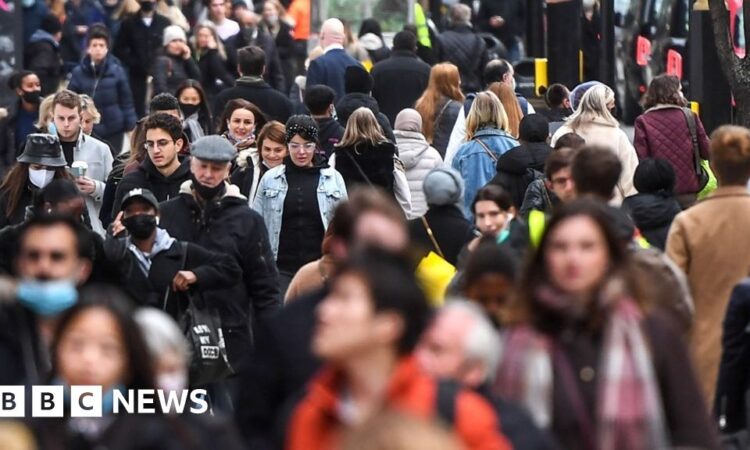
- By Becky Morton
- Political reporter
Image source, Getty Images
Labour’s Darren Jones had suggested “a couple of hundred thousand a year” would be a normal level for net migration
Labour has said it will not set an “arbitrary target” on cutting net migration.
It comes after a shadow minister told the BBC the party hoped figures would reach a “normal level” of “a couple of hundred thousand a year” if it wins the next election.
Darren Jones said the numbers would depend on the needs of the economy.
A Labour spokesperson said it expected its proposals would lead to a fall in net migration.
“Labour’s position hasn’t changed. As we have set out we will scrap the 20% wage discount, review the skilled worker salary threshold and reform the Migration Advisory Committee to link it to the bodies setting out industrial and skills strategy,” the spokesperson said after Mr Jones’ BBC interview earlier.
“As a result of these measures we expect net migration will go down, but we won’t set an arbitrary target unlike the Tories – who have never come close to meeting it.”
The Conservatives are under pressure to cut migration after new figures showed it reached record levels last year.
Labour leader Sir Keir Starmer has described the figure as “shockingly high”, while Prime Minister Rishi Sunak has also said immigration levels are too high and need to come down “to sustainable levels”.
Labour has said it would increase the salary requirements for foreign workers to come to the UK, based on recommendations from the independent Migration Advisory Committee.
Back in 2010, Lord David Cameron, the former Tory prime minister who was appointed foreign secretary in the recent reshuffle, pledged to get net migration below 100,000 – but the commitment has never been met.
The Conservative Party’s 2019 manifesto also promised to bring overall numbers down, without setting a specific target, after the introduction of post-Brexit border controls.
Asked on the BBC’s Sunday with Laura Kuenssberg what a reasonable level of net migration would be, Mr Jones said: “The normal level is a couple of hundred thousand a year but it depends on the needs in the economy.”
Pressed on whether this would be something Labour would hope to achieve in its first term in government, if the party wins power, Mr Jones said: “I think we probably would hope to do that, yes, but we’ve talked about a decade of national renewal.”
However, he added that the Conservatives had left “deep structural problems” which would “take time to fix”.
Mr Jones suggested the “abnormally high number of work visas”, particularly for health and social care, reflected issues with the way the NHS was being run by the government.
He called for “a proper NHS workforce plan” and improvements in productivity so the UK was not so reliant on workers from overseas.
The vast majority of those arriving in the UK in the year ending June 2023 were from outside the European Union.
Students accounted for the largest group of non-EU migrants, followed by those coming for work. The ONS said this could largely be attributed to people on health and care visas, with the sector facing chronic staff shortages.
However, it said provisional figures suggested the rate of net migration could now be slowing, with the estimated number falling back to 672,000 in the year to June.
Chief Secretary to the Treasury Laura Trott said this was “positive news” but that the government was taking further steps to cut migration.
Ms Trott told the BBC the government’s long-term plan for the NHS workforce would also mean more people would be trained for jobs in health and social care.
These include increasing the minimum salary required for a work visa and introducing a cap on health and social care visas.






